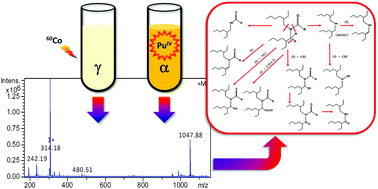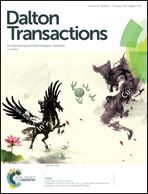Radiolytic stability of N,N-dialkyl amide: effect on Pu(iv) complexes in solution†
Abstract
The radiolytic degradation of three N,N-dialkyl amide ligands relevant to nuclear fuel reprocessing was studied. The degradation of these ligands: N,N di-2-ethyhexylbutyramide (DEHBA), N,N di-2-ethyhexylisobutyramide (DEHiBA) and N,N di-2-ethyhexyl-3-dimethylbutanamide (DEHDMBA) was examined to evaluate the effect of the structure on the formation of degradation products as well as to compare alpha induced degradation to gamma induced degradation. In situ alpha radiolysis by introduction of plutonium(IV) as the alpha source in the solution and ex situ gamma radiolysis with 60Co as the gamma source were compared. Upon identification of the main degradation products, a degradation scheme was proposed. The effects of radiation on the stability of Pu-monoamide complexes were discussed. Theoretical calculations were also performed to determine bond dissociation energy and estimate the relative strength of the bond in the molecule. The results show that neither the type of radiation (alpha vs. gamma) nor the structure modification (introduction of branching on the alkyl chain off the carbonyl carbon) of the molecule significantly impact the formation of degradation products under the conditions studied. Moreover, it was observed that the overall stability of the monoamide remains good and that Pu complexation is not greatly affected by either alpha or gamma irradiation.



 Please wait while we load your content...
Please wait while we load your content...